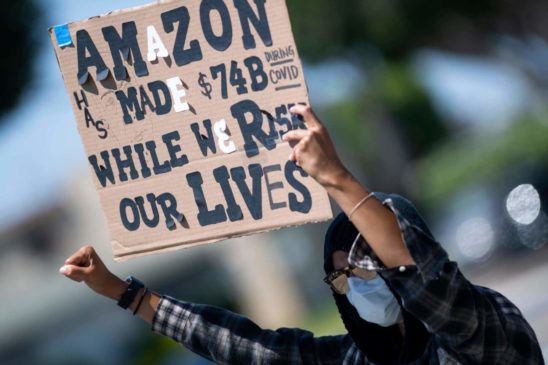- The coronavirus pandemic presents both opportunities and threats to Amazon.
- Legislative scrutiny will only grow as Amazon’s dominance becomes more evident.
- An increasing number of its lowly paid workers have been dangerously exposed to the novel coronavirus.
Amazon (NASDAQ:AMZN) has emerged as one of the leading beneficiaries of the coronavirus pandemic.
Lockdown orders due to OVID-19 have boosted not only Amazon’s online retail business but its cloud computing unit as well. At one point, the e-commerce behemoth restricted sales to just essential items following a surge in demand.
Amazon has also postponed its blockbuster shopping event Prime Day to September as demand is still overwhelming. The event is normally held in July.
Amazon’s Good Fortunes
Year-to-date, the stay-at-home stock has surged by around 30%, helping the Nasdaq Composite to positive territory for 2020.
Amazon’s good fortune has allowed CEO Jeff Bezos to increase his net worth by more than $30 billion.
There’s no doubt that the coronavirus pandemic has presented Amazon with unprecedented opportunities. But that has also come with threats.
Here are three ways the e-commerce leader could find itself negatively impacted by COVID-19.
Amazon Workers could finally unionize
While Amazon has not revealed the number of employees that are infected with COVID-19, it could be in the hundreds. Amazon boasts of over half a million employees in the U.S.
Earlier this month, an Amazon vice-president resigned in protest at the company’s decision to fire whistleblowers who had been “making noise about warehouse employees frightened of COVID-19.”
So far, eight Amazon warehouse workers have died from COVID-19 in the U.S.
COVID-19’s impact on Amazon workers has created a conducive environment for unionization. Such attempts have been unsuccessful in the past two decades, but the pandemic is likely to tip the scales.
How Amazon has fought off unionization for decades
Management’s efforts to prevent unionization now face greater odds. Previously, Amazon was able to hire employee-relations managers who could thwart unionization activities.
Watch Amazon’s union-busting video meant for management trainees below:
Some of the labor groups and unions that are said to be targeting Amazon include relatively new worker advocacy groups such as Athena and Warehouse Workers for Justice. Established organizations include the Retail, Wholesale and Department Store Union, the United Food & Commercial Workers International Union, and the American Federation of Labor and Congress of Industrial Organizations.
While unionization could be good for workers, it will only increase Amazon’s operating expenses. A unionized workforce will also increase the scale and frequency of strikes, protests, and walkouts.
For a company that prides itself on excelling at customer satisfaction, disruptions caused by such union-sanctioned activities pose a big threat to its business model.
Coronavirus pandemic to bring fierce competition
The shelter-in-place measures have increased the size of the e-commerce and logistics market. It is also uncertain whether the novel coronavirus will ever be completely contained. And with the possibility of other similar outbreaks in the future, companies are eyeing this booming space.
Just this week, Facebook unveiled Facebook Shops, a feature that will allow sellers to set up digital stores on the main social media channel as well as on Instagram. That’s a potential reach of nearly 3 billion users. Facebook Shops will also integrate with delivery and other logistics services.
And earlier this week, Microsoft (NASDAQ: MSFT) and FedEx (NYSE: FDX) partnered to “transform commerce.”
Initially, the partnership is aimed at improving shipping but could in the future directly compete with Amazon’s core business.
Harsher spotlight in Washington
As coronavirus rages on, Amazon’s sheer power and scale have become evident. Lawmakers will be taking notice again.
Months after suspending her presidential campaign, Sen. Elizabeth Warren has renewed calls to split Amazon:
This is exactly what happens when you let a giant company be both the umpire and a player in the game. Amazon needs to explain why it misled Congress — and we need to break up Amazon and big tech.
Sen. Josh Hawley, a Republican of Missouri, also wants Amazon investigated. He believes the online retailer employs
predatory and exclusionary data practices to build and maintain a monopoly.
Calls to curb Amazon’s power are likely to grow louder in the coming months.
Disclaimer: The opinions expressed in this article do not necessarily reflect the views of CCN.com.
This article was edited by Sam Bourgi.




